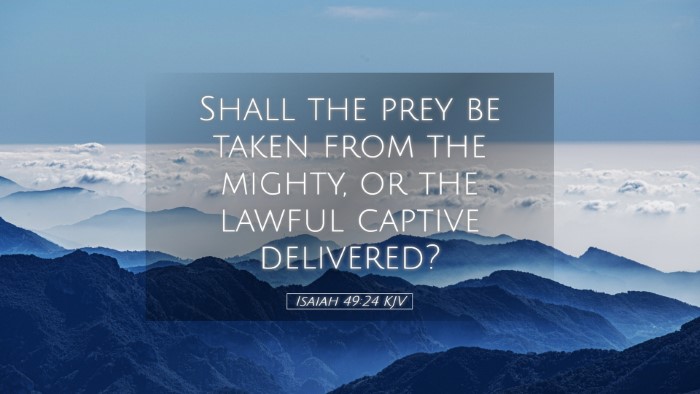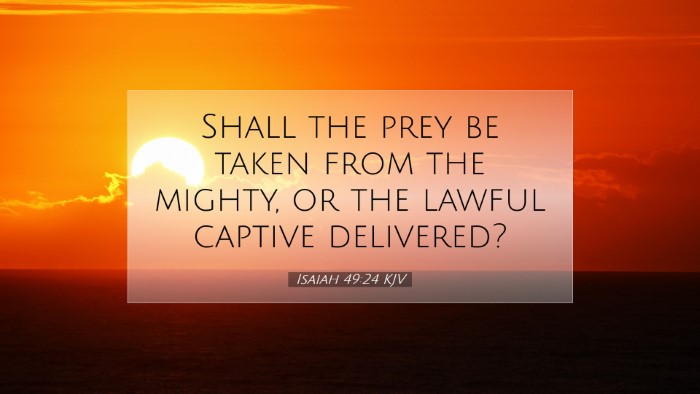Isaiah 49:24 Commentary
Bible Verse: “Shall the prey be taken from the mighty, or the lawful captive delivered?” (Isaiah 49:24)
Contextual Background
The book of Isaiah is a pivotal text in the Old Testament, synthesizing prophecy, poetry, and history. Written during a time of distress and impending captivity for Israel, the prophet Isaiah communicates both judgment and hope. Chapter 49 emphasizes God's sovereign plan for Israel and the larger world, with a focus on the restoration of His people.
Theological Significance
This verse poses a rhetorical question that challenges the perceived strength of oppressors — primarily Babylon at the time. It showcases God's power and ability to deliver His people against all odds. As Matthew Henry notes, this verse highlights the confidence believers can have in God's promises of preservation and deliverance.
Insights from Public Domain Commentaries
-
Matthew Henry:
Henry emphasizes the despair of those in captivity who felt irretrievably lost. However, he notes, "the question is posed to instill doubt on the oppressor's strength." The Almighty is portrayed as the ultimate source of deliverance, suggesting that no power can withstand His will. Henry argues for a robust faith in God's ability to reclaim and restore, even when circumstances appear dire.
-
Albert Barnes:
Barnes elaborates on the phrase “the lawful captive,” elucidating that these refer to those captured as a rightful consequence of their disobedience. His commentary reflects on the dual nature of captivity: spiritual and physical. Barnes notes that God’s power extends to both realms, showcasing His authority to release even those who seem justly held. His interpretation encourages a broader view of redemption — not limited to physical salvation but extending to spiritual liberation as well.
-
Adam Clarke:
Clarke’s insight brings a contemporary relevance to the text, stressing that God's ability to free “the prey from the mighty” transcends geographical and historical contexts. He affirms that the verse serves as a reassurance for all Christians, illustrating that regardless of life’s chains — be they sin, oppression, or despair — God can and will deliver. Furthermore, Clarke comments on God’s merciful character, emphasizing that forensic justice does not negate divine mercy.
Practical Applications
This verse has profound implications for pastors, students, and theologians. It serves as a reminder that God's redemptive power is not limited by human constraints. Here are a few key applications:
- Hope in Deliverance: The assurance that God can deliver us from our spiritual and earthly struggles is crucial for pastors providing counsel and for individuals seeking restoration.
- Understanding Justice and Mercy: The balance of God’s justice (allowing captivity) and His mercy (offering deliverance) is fundamental in teaching and preaching contexts.
- Encouraging Faith in Adversity: This passage can be a source of encouragement for those who feel trapped in their circumstances, reinforcing the idea that God sees their plight and has the power to change their situation.
- Emphasis on Prayer: The importance of prayer in seeking deliverance should be highlighted, echoing the sentiment that reliance on God is essential for overcoming adversity.
Conclusion
Isaiah 49:24 stands as a powerful declaration of God's omnipotence and compassion. As believers reflect on this scripture, they are invited into a deeper understanding of God's promise to deliver. By combining the rich insights of classic commentaries, one can gain a multifaceted perspective that enhances theological study and practical ministry applications. Let this verse serve as a reminder that no force is too great for the God who rescues His people.


